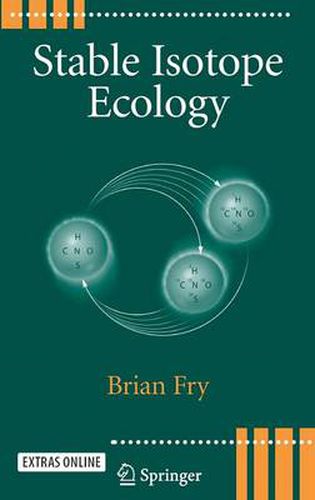Readings Newsletter
Become a Readings Member to make your shopping experience even easier.
Sign in or sign up for free!
You’re not far away from qualifying for FREE standard shipping within Australia
You’ve qualified for FREE standard shipping within Australia
The cart is loading…






This title is printed to order. This book may have been self-published. If so, we cannot guarantee the quality of the content. In the main most books will have gone through the editing process however some may not. We therefore suggest that you be aware of this before ordering this book. If in doubt check either the author or publisher’s details as we are unable to accept any returns unless they are faulty. Please contact us if you have any questions.
Stable isotopes are frequently used as tracers in biological systems, and their ability to track changes and processes over time has made them increasingly important to ecological research. For ecologists, stable isotopes provide a natural way to directly trace details of element cycling in the environment. Stable Isotope Ecology provides a solid introduction to this advanced subject, and can also be used as an instructive review for more experienced researchers and professionals. The book approaches the use of isotopes from the perspective of ecological and biological research, but its concepts can be applied within other disciplines as well. In order to enable scientists to establish source-sink connections in ecological settings, Stable Isotope Ecology begins by reviewing fundamental topics of tracer fractionation and mixing. Several mini-reviews profile problems and successes encountered with isotope tracing in particular focus areas, while emphasizing the role that humans increasingly play in changing our planetary ecosphere.A novel, step-by-step spreadsheet modeling approach is also presented for circulating tracers in any ecological system, including any favorite system an ecologist might dream up while sitting at a computer. Just type in values and watch the isotope action unfold in the dynamic models. Fry’s humorous and lighthearted style painlessly imparts the principles of isotope ecology, using a unique, hands-on approach to engage students. The mechanics of fractionation and mixing are laid out in simple steps, with numerous examples and accessible mathematics (algebra only). The book encourages students to begin their own pilot project with stable isotopes. The attached CD-ROM contains color illustrations, spreadsheet models, technical appendices, and problems and answers. The CD materials are accessible for novices and experts alike, and enhance the learning experience, adding electronic dynamics to the printed book. About the Author: Dr. Brian Fry is a Professor in the Coastal Ecology Institute and the Department of Oceanography and Coastal Studies at Louisiana State University in Baton Rouge, Louisiana.His mother and father both used isotopes in their research careers, so he is a second generation isotope scientist.
$9.00 standard shipping within Australia
FREE standard shipping within Australia for orders over $100.00
Express & International shipping calculated at checkout
This title is printed to order. This book may have been self-published. If so, we cannot guarantee the quality of the content. In the main most books will have gone through the editing process however some may not. We therefore suggest that you be aware of this before ordering this book. If in doubt check either the author or publisher’s details as we are unable to accept any returns unless they are faulty. Please contact us if you have any questions.
Stable isotopes are frequently used as tracers in biological systems, and their ability to track changes and processes over time has made them increasingly important to ecological research. For ecologists, stable isotopes provide a natural way to directly trace details of element cycling in the environment. Stable Isotope Ecology provides a solid introduction to this advanced subject, and can also be used as an instructive review for more experienced researchers and professionals. The book approaches the use of isotopes from the perspective of ecological and biological research, but its concepts can be applied within other disciplines as well. In order to enable scientists to establish source-sink connections in ecological settings, Stable Isotope Ecology begins by reviewing fundamental topics of tracer fractionation and mixing. Several mini-reviews profile problems and successes encountered with isotope tracing in particular focus areas, while emphasizing the role that humans increasingly play in changing our planetary ecosphere.A novel, step-by-step spreadsheet modeling approach is also presented for circulating tracers in any ecological system, including any favorite system an ecologist might dream up while sitting at a computer. Just type in values and watch the isotope action unfold in the dynamic models. Fry’s humorous and lighthearted style painlessly imparts the principles of isotope ecology, using a unique, hands-on approach to engage students. The mechanics of fractionation and mixing are laid out in simple steps, with numerous examples and accessible mathematics (algebra only). The book encourages students to begin their own pilot project with stable isotopes. The attached CD-ROM contains color illustrations, spreadsheet models, technical appendices, and problems and answers. The CD materials are accessible for novices and experts alike, and enhance the learning experience, adding electronic dynamics to the printed book. About the Author: Dr. Brian Fry is a Professor in the Coastal Ecology Institute and the Department of Oceanography and Coastal Studies at Louisiana State University in Baton Rouge, Louisiana.His mother and father both used isotopes in their research careers, so he is a second generation isotope scientist.